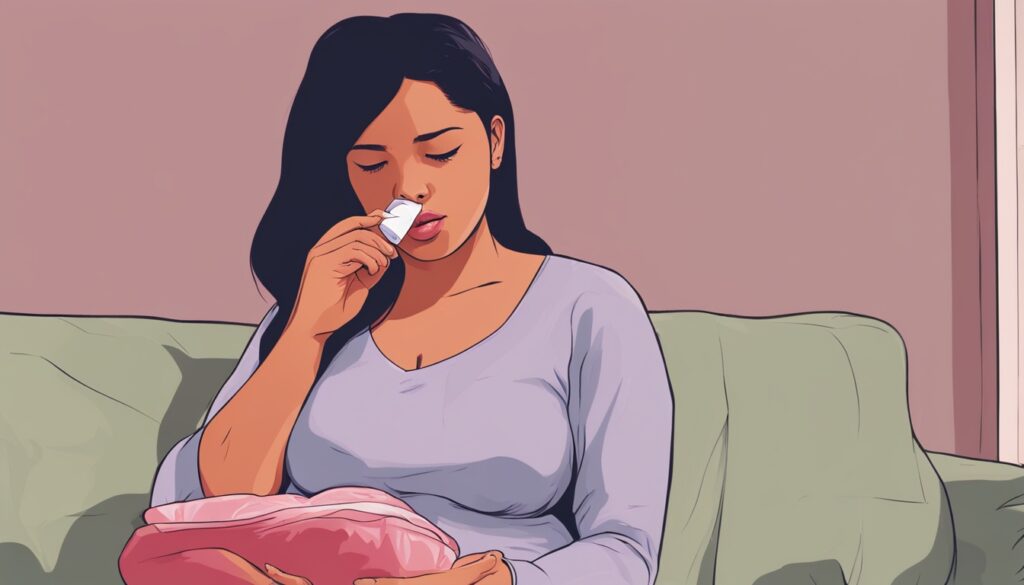Are you eager to learn about the early signs and symptoms of pregnancy? You’ve found the right spot to start your pregnancy journey with healthy eating, yoga, and preparation. The first signs of pregnancy can differ from one person to another. Common signs include missing your period or having a lighter one, feeling sick, or experiencing morning sickness. You might also feel very tired, have sore and swollen breasts, need to pee more often, feel moody, bloated, or see some light spotting.
These symptoms come from the fast hormonal changes in the first weeks of pregnancy. It’s key to take a pregnancy test and see a healthcare provider if you think you might be pregnant. Early prenatal care is vital for a healthy pregnancy.

Key Takeaways : What is early signs and symptoms of pregnancy
- Missed or lighter period is a common early sign of pregnancy.
- Feeling nauseous or experiencing morning sickness can start as early as one to two months after conception.
- Fatigue, sore and swollen breasts, and increased urination are other typical early pregnancy symptoms.
- Mood swings, bloating, and light spotting are also potential early signs of pregnancy.
- Taking a pregnancy test and seeking medical care are important steps when suspecting pregnancy.
Common Early Signs and Symptoms of Pregnancy
One of the first signs of pregnancy is missing or having a lighter period. Hormonal changes can affect the menstrual cycle early on. Around 4 to 6 weeks pregnant, many women notice their breasts getting tender and swelling.
Nausea and vomiting, known as “morning sickness,” are also common early signs. But, these symptoms can happen any time, not just in the morning. They usually start around weeks 4 to 6 and can last into the first trimester.
Feeling the need to pee more often is another sign of pregnancy. This often starts around the 6th or 8th week after conception. It’s caused by the surge in hormone levels and blood production early on.
Feeling very tired is a common symptom of early pregnancy. By around 12 weeks, many women feel more tired than usual. This is due to the body adjusting to hormonal changes and making more blood.
| Early Pregnancy Symptom | Typical Onset |
|---|---|
| Missed or lighter period | 4-6 weeks |
| Tender, swollen breasts | 4-6 weeks |
| Nausea and vomiting | 4-6 weeks |
| Increased urination | 6-8 weeks |
| Fatigue | Around 12 weeks |
Every pregnancy is different, and the early signs and symptoms can vary. If you think you might be pregnant, try a home pregnancy test or talk to your healthcare provider.

Other Potential Early Pregnancy Symptoms
Some women may notice signs of early pregnancy that are not as common. These signs include mood swings, bloating, and light spotting or implantation bleeding. They can happen in the early stages of pregnancy.
Mood Swings
Hormonal changes in the first weeks of pregnancy can make women feel moody. Women may feel irritable, anxious, or sad, similar to before their periods. These feelings usually go away as the body gets used to the new hormonal balance.
Bloating
Bloating, or feeling full or swollen in the belly, is a common symptom of early pregnancy. It’s similar to the bloating some women feel before their periods. The hormonal changes slow down digestion, causing gas, constipation, and a bloated look. This feeling usually gets better as pregnancy goes on.
Light Spotting
Light spotting or implantation bleeding can happen when the fertilized egg attaches to the uterus, 10-14 days after conception. This bleeding is usually light and short, unlike a regular period. About one-third of women may see this as an early sign of pregnancy.
Not all women will notice these extra early symptoms. But knowing about them can make you feel more secure in the early stages of pregnancy. Always talk to a healthcare provider if you have any worries or questions.
Signs and Symptoms of Pregnancy Week by Week
Pregnancy is a wonderful journey. The signs and symptoms change a lot throughout the stages. Knowing what to expect week by week helps you keep an eye on your health and the baby’s growth.
In the early weeks, signs like missing your period, feeling sick, and being very tired might be the first clues you’re pregnant. Later on, you might notice your breasts getting bigger, your belly growing, and feeling the baby move.
Doctors say pregnancy starts from the first day of your last period. This is when conception usually happens, about 14 days later. The fertilized egg sticks to the uterus around 5-6 days after that.
By 5-6 weeks after the first day of your last period, most people start feeling pregnancy symptoms. You might get a positive test as early as 10 days after conception. But, waiting a week after missing your period is best for accurate results.
| Weeks of Pregnancy | Common Symptoms |
|---|---|
| Weeks 1-2 | Slight bleeding, swollen breasts, fatigue, nausea, mood swings |
| Weeks 5-6 | 50-70% of women experience pregnancy symptoms, including missed period, nausea, vomiting, fatigue, frequent urination, breast tenderness, and swelling |
| Week 8 | 90% of women have pregnancy symptoms, including heartburn, nasal congestion, shortness of breath, lightheadedness, spider veins, itchiness, and areas of darker skin |
As pregnancy goes on, the signs and symptoms keep changing. You might feel forgetful, dizzy, crave certain foods, eat more, have lower back pain, and more. Keeping up with these changes is key to a healthy pregnancy.
Signs and symptoms of pregnancy, missed periods, morning sickness, and fatigue
Pregnancy brings many early signs, and they can differ a lot from one person to another. Common early signs include missing or lighter periods, feeling sick in the morning, and feeling very tired.
Missing a period is often the first clue that someone might be pregnant. This happens because the body stops menstruating to support the growing baby. About 1 in 5 people worldwide face mental health issues during pregnancy. Hormonal changes can also cause bloating, constipation, and headaches.
Nausea and vomiting, known as “morning sickness,” affects up to 80% of pregnant people. This symptom can happen any time, not just in the morning. Some people feel nauseous the whole time they are pregnant.
Feeling very tired is another early sign of pregnancy. This tiredness can start as early as a week after conception. It’s because the body is working hard to support the growing baby. Most pregnant women feel very tired, especially in the first three months.
- Missing or lighter periods are often the first signs of pregnancy.
- Nausea and vomiting, or “morning sickness,” can happen at any time and affects up to 80% of pregnant people.
- Feeling very tired is common in early pregnancy, starting as early as a week after conception.
If you notice any of these early pregnancy signs, talk to your healthcare provider. They can help address any concerns and confirm if you are pregnant.
“Pregnancy can bring a wide range of early signs and symptoms, including missed periods, morning sickness, and fatigue.”
Pregnancy Tests and Confirming Pregnancy : What is early signs and symptoms of pregnancy
Confirming a pregnancy can be both exciting and a bit overwhelming. The best way to confirm a pregnancy is through a pregnancy test. You can use either a home test or a blood test done by a healthcare provider. Home pregnancy tests look for human chorionic gonadotropin (hCG), a hormone made during pregnancy.
Home Pregnancy Tests
Home pregnancy tests offer a quick and easy way to check for pregnancy. They check for hCG in your urine and are usually very accurate after a missed period. It’s best to wait at least one week after a missed period for the most accurate results.
Blood Tests
If a home pregnancy test shows you’re pregnant, getting a blood test is a good next step. Blood tests give clearer info on your pregnancy’s stage and hCG levels. Healthcare providers use these tests to confirm pregnancy and track its progress.
Ultrasound Scans
Ultrasound scans are another way to confirm pregnancy and see how the fetus is doing. These tests can spot the gestational sac and the baby’s heartbeat, usually by 6-8 weeks of pregnancy.
It’s crucial to work closely with your healthcare provider to confirm a pregnancy and start your pregnancy journey off right.
| Pregnancy Confirmation Method | Timeframe | Accuracy |
|---|---|---|
| Home Pregnancy Test | 1 week after missed period | Generally accurate, but may vary |
| Blood Test | 6-8 days after ovulation | Highly accurate |
| Ultrasound Scan | 6-8 weeks of pregnancy | Highly accurate |
Bodily Changes During Early Pregnancy : What is early signs and symptoms of pregnancy
As the body adjusts to the dramatic hormonal shifts during early pregnancy, women may experience a variety of bodily changes and physical changes. These early pregnancy changes can include a range of symptoms that signal the beginning of a new life.
One of the most well-known early signs is morning sickness. In fact, nausea and vomiting affect up to 85% of pregnant women, typically starting before the ninth week of pregnancy. Increased breast size and tenderness are also common, as the body prepares for breastfeeding.
Along with these changes, many women experience frequent urination, fatigue, and even mood swings during the early stages of pregnancy. Bloating, constipation, and nasal congestion can also occur as the body adapapts to the hormonal fluctuations.
| Bodily Change | Typical Onset | Cause |
|---|---|---|
| Morning Sickness | Before 9 weeks | Hormonal Changes |
| Breast Changes | Early Pregnancy | Preparation for Breastfeeding |
| Increased Urination | Early Pregnancy | Increased Blood Production |
| Fatigue | Early Pregnancy | Hormonal Changes, Increased Blood Production |
| Mood Swings | Early Pregnancy | Hormonal Changes, Metabolic Changes, Stress, Fatigue |
| Bloating | Early Pregnancy | Hormonal Changes, Water Retention |
| Constipation | Early Pregnancy | Slower Gastrointestinal Movement |
| Nasal Congestion | Early Pregnancy | Hormonal Changes, Nasal Inflammation |
While these bodily changes and physical changes can be overwhelming, it’s important to remember that they are a normal part of the early pregnancy changes your body is experiencing. By understanding these symptoms, you can better prepare and manage the early stages of your pregnancy journey. What is early signs and symptoms of pregnancy?
Fetal Development in the First Trimester
The first trimester of pregnancy is key for a new life’s start. In these 13 weeks, the fertilized egg turns into an embryo and then a fetus. This sets the stage for the baby’s health and growth during pregnancy.
At the start, the embryo grows fast and develops important organs and systems. By 4 weeks after conception, it implants in the uterus, starting the embryonic stage. Soon, organs like the heart and lungs start to form.
By 9 weeks, the fetus may start moving. By 10 weeks, its fingers and toes look more like a human’s. Around 10 to 12 weeks, doctors can hear the baby’s heart beat with a handheld device.
As the first trimester goes on, the fetus keeps growing. By the end of the third month, all vital organs and parts are ready. This stage is vital for the fetus to grow and do well in the future.
“The first trimester is a time of incredible transformation, as the embryo and fetus rapidly develop the building blocks for a healthy, thriving baby.”
The first trimester brings pregnancy symptoms like morning sickness and tiredness. Yet, it’s also filled with hope and joy as the new life grows. By the end of this key period, the fetus is set to become a fully formed, viable human being.
Healthy Eating and Nutrition for Pregnancy
During pregnancy, eating well and getting enough nutrients is key. Expectant moms should eat a diet full of fruits, veggies, whole grains, lean proteins, and healthy fats. This helps us stay healthy and supports our baby’s growth.
Foods to Avoid
It’s also important to avoid some foods to keep us and our babies safe. We should not eat raw or undercooked meats, unpasteurized dairy, high-mercury fish, soft cheeses, deli meats, and raw sprouts. These foods can increase the risk of getting sick.
Essential Nutrients
Prenatal vitamins are often suggested to pregnant women. They contain important nutrients like folic acid, iron, and calcium. Folic acid is especially important in the first four weeks to prevent certain birth defects. Pregnant women also need choline, omega-3 fatty acids, and other vitamins and minerals for good health.
By choosing wisely and eating a variety of nutrient-rich foods, we can make sure we and our babies get the nutrients we need to be healthy.
“Proper nutrition during pregnancy is crucial for the health and development of both the mother and the baby.”
Natural Remedies for Morning Sickness at home
Pregnancy is exciting, but morning sickness can make the early weeks tough. Up to 80% of pregnant women suffer from nausea and vomiting in the first three months. Luckily, there are natural ways to feel better. What is early signs and symptoms of pregnancy.
Ginger is a top choice for easing morning sickness. You can have it as tea, candy, or a supplement. It helps calm your stomach. Peppermint is also great, as its smell can cover up bad food smells that make you feel sick.
- Ginger tea or supplements
- Peppermint aromatherapy or lozenges
- Vitamin B6 supplements
- Acupressure wristbands
- Sour candies or lemons
- Bland, starchy snacks like crackers or toast
Drinking plenty of water is key when you’re fighting morning sickness. Aim for at least 10 full glasses a day. Vitamin B6 supplements can also help lessen nausea and vomiting.
Always talk to a healthcare provider before trying natural remedies. They can suggest safe and effective options. If morning sickness is severe or doesn’t go away, you might need medicine to prevent dehydration or weight loss.
“Ginger has been noted for its tummy-taming properties and can be consumed in various forms like tea, candy, or lozenges.”
Trying natural remedies can help ease morning sickness and support a healthy pregnancy. With some trial and error, we can find what works best for us.
Exercises and Activities During Pregnancy
Being active during pregnancy is great for both mom and baby. Prenatal yoga, walking, swimming, and light strength training are good choices. Always check with your doctor to make sure they’re right for you.
Exercising can help manage weight, boost mood, and get your body ready for childbirth. It’s key to talk to your healthcare provider about what’s best for your pregnancy stage and any health issues you have. What is early signs and symptoms of pregnancy.
Recommended Pregnancy Exercises and Activities
- Prenatal Yoga: Try a prenatal yoga class once a week to build strength and balance.
- Walking: Begin with 10 minutes a day, 3 to 5 times a week, and increase to 30 minutes daily.
- Swimming and Water Aerobics: Do water exercises 3 to 5 times a week for 30 minutes each session.
- Strength Training: Do low to moderate intensity strength training twice a week during pregnancy.
- Stationary Cycling: Aim for 2 or 3 sessions per week of 30 minutes to an hour on a stationary bike or in spin classes in the first trimester.
Listen to your body and don’t push yourself too hard. If you feel more tired than energized, or if you experience pain, it’s a sign to slow down. Always talk to your healthcare provider if you’re worried about your exercise routine during pregnancy.
| Exercise Frequency | Recommendation |
|---|---|
| Pregnancy Exercise Frequency | Gradually work up to 30 minutes of exercise per day, 3 to 5 times per week |
| Prenatal Pilates | A prenatal Pilates workout once a week |
| Yoga Frequency | Half an hour of yoga per day or a 30-minute session per week |
| Walking Frequency | Start with 10 minutes a day, 3 to 5 times a week and work up to 30 minutes per day |
| Swimming and Water Aerobics | 3 to 5 times a week for 30 minutes each session |
| Running | 30 minutes at least 3 days per week if it feels comfortable and if one was a runner before pregnancy |
| Weight Training | Low to moderate intensity strength training twice a week |
| Stationary Bike and Spin Class | 2 or 3 sessions per week of 30 minutes to an hour during the first trimester |
Being active during pregnancy can ease discomfort, lift your mood, and prepare you for childbirth. Always make sure your exercise plan is safe and fits your needs by talking to your healthcare provider.
Conclusion
Knowing the early signs of pregnancy is key to confirming it and starting prenatal care. Common signs include missing or lighter periods, morning sickness, feeling very tired, and sore breasts. These signs help women keep track of their health and the baby’s growth.
Women should take a pregnancy test and see a healthcare provider to confirm the pregnancy. This step is crucial for getting the right medical advice and support. Prenatal care is vital for the health of both the mother and the baby. It involves eating well, managing morning sickness, staying active, and addressing any concerns. What is early signs and symptoms of pregnancy.
Being aware of pregnancy signs helps women take the right steps for a healthy pregnancy. With the right knowledge and support, they can handle the first trimester’s challenges. They can look forward to the exciting milestones that come next.
Early signs of pregnancy can vary but often include missing a period or feeling sick. You might also feel tired, have sore and swollen breasts, need to pee more, feel moody, bloated, or spot lightly.
Missing your period is a top sign of pregnancy. Hormonal changes can also make your breasts tender and swollen.
Besides missing periods and breast changes, you might feel nauseous, need to pee a lot, or get very tired early on.
Yes, mood swings, bloating, and light spotting or implantation bleeding are common early on.
Pregnancy signs change as it progresses. Early on, look for missed periods, nausea, and fatigue. Later, you might notice your breasts getting bigger, your belly growing, and feeling the baby move.
Confirm pregnancy with a pregnancy test or a blood test from a doctor. Home tests look for hCG hormone. A positive test means you should get a blood test and an ultrasound.
Early pregnancy brings changes like bigger, more sensitive breasts, needing to pee more, constipation, and stuffy nose.
The first three months see the embryo grow into a fetus. It grows fast, forming vital organs and systems. By the end of the first trimester, the fetus has all major organs ready and starts looking more human.
Eat well to support your pregnancy. Focus on fruits, veggies, whole grains, lean meats, and healthy fats. Avoid raw meats, unpasteurized dairy, and high-mercury fish to keep your baby safe.
Yes, ginger, peppermint, and vitamin B6 can ease nausea. Acupressure, aromatherapy, and drinking plenty of water can also help. Always check with your doctor before trying new remedies.
Being active is good for you and your baby. Try prenatal yoga, walking, swimming, or light strength training. Always talk to your doctor to make sure it’s right for you.
early signs and symptoms of pregnancy week by week, missed periods, morning sickness and fatigue, pregnancy tests, blood tests, ultrasound tests to confirm pregnancy and how to prepare for, fetal development and bodily changes, healthy eating tips and nutrition advice during pregnancy including foods to avoid and essential nutrients, safe exercises and workouts to do during pregnancy, including prenatal yoga and stretching, natural remedies and tips to alleviate morning sickness and nausea
Are you really eager to know the early signs and symptoms of pregnancy? You are at the right place to know your journey of your preganacy with healthy diet, yoga and how to prepare yourself.






